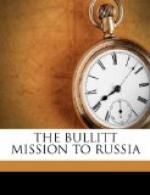Mr. Lloyd George expressed the view that the acceptance of M. Sonnino’s proposals would amount to their hearing a string of people, all of whom held the same opinion, and all of whom would strike the same note. But they would not hear the people who at the present moment were actually controlling European Russia. In deference to M. Clemenceau’s views, they had put forward this new proposal. He thought it would be quite safe to bring the Bolshevist representatives to Salonika, or perhaps to Lemnos.
It was absolutely necessary to endeavor to make peace. The report read by President Wilson that morning went to show that the Bolshevists were not convinced of the error of their ways, but they apparently realised the folly of their present methods. Therefore they were endeavouring to come to terms.
President Wilson asked to be permitted to urge one aspect of the case. As M. Sonnino had implied, they were all repelled by Bolshevism, and for that reason they had placed armed men in opposition to them. One of the things that was clear in the Russian situation was that by opposing Bolshevism with arms, they were in reality serving the cause of Bolshevism. The Allies were making it possible for the Bolsheviks to argue that Imperialistic and Capitalistic Governments were endeavouring to exploit the country and to give the land back to the landlords, and so bring about a re-action. If it could be shown that this was not true, and that the Allies were prepared to deal with the rulers of Russia, much of the moral force of this argument would disappear. The allegation that the Allies were against the people and wanted to control their affairs provided the argument which enabled them to raise armies. If, on the other hand, the Allies could swallow their pride and the natural repulsion which they felt for the Bolshevists and see the representatives of all organized groups in one place, he thought it would bring about a marked reaction against Bolshevism.
M. Clemenceau said that, in principle, he did not favour conversation with the Bolshevists; not because they were criminals, but because we would be raising them to our level by saying that they were worthy of entering into conversation with us. The Bolshevist danger was very great at the present moment. Bolshevism was spreading. It had invaded the Baltic Provinces and Poland, and that very morning they received very bad news regarding its spread to Budapesth and Vienna. Italy, also, was in danger. The danger was probably greater there than in France. If Bolshevism, after spreading in Germany, were to traverse Austria and Hungary and so reach Italy, Europe would be faced with a very great danger. Therefore, something must be done against Bolshevism. When listening to the document presented by President Wilson that morning, he had been struck by the cleverness with which the Bolshevists were attempting to lay




